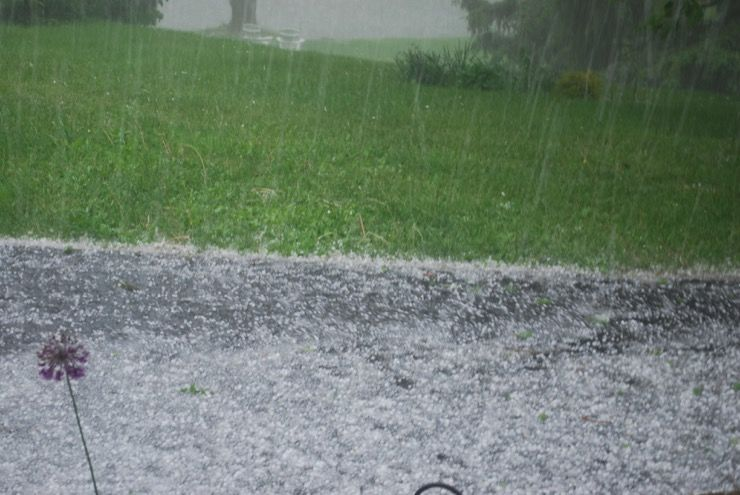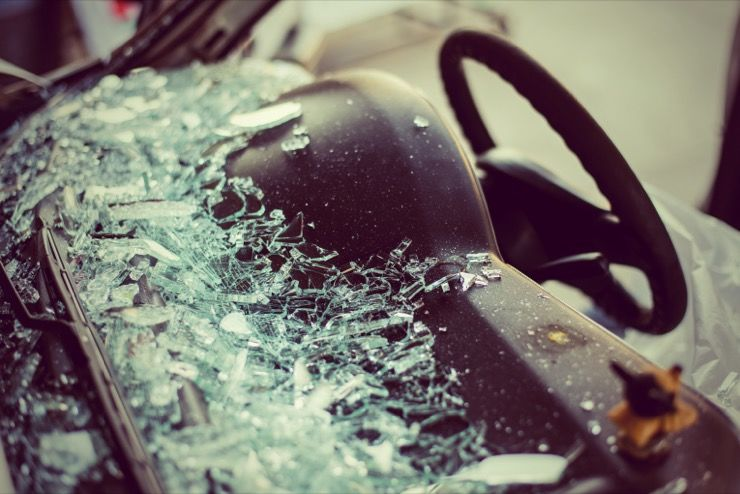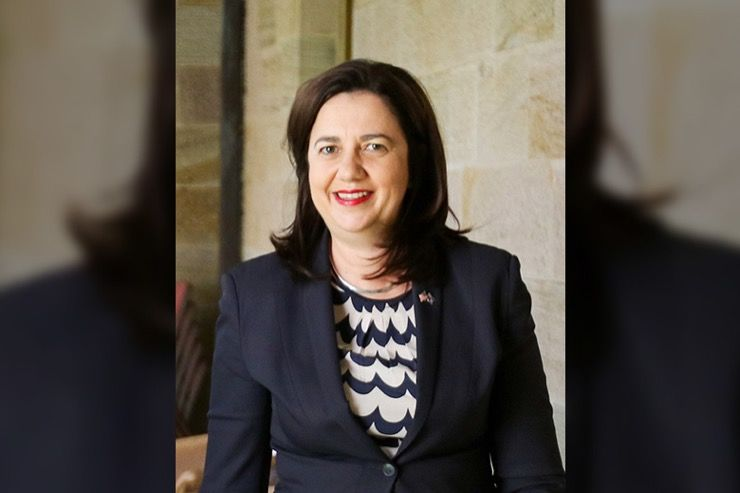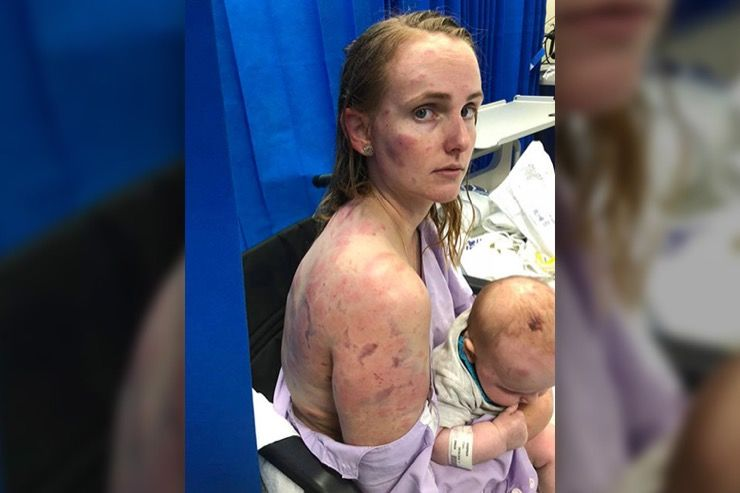Fiona Simpson was just 23 years old when she proved to the world that a mother’s love knows no bounds. It was supposed to be a routine drive home, one she had taken many times before. The road stretched ahead of her, long and familiar, winding through Queensland, Australia. It was a peaceful day, clouds gathering slowly in the sky, a light drizzle accompanying her journey.
She wasn’t alone. In the back seat, her four-month-old daughter slept soundly, her tiny hands curled into fists. Beside Fiona sat her 78-year-old grandmother, a woman who had seen her fair share of storms in life, both literal and figurative. The three generations of women were together, making their way home along D’Aguilar Highway.
What they didn’t know was that nature had something violent in store.
Fiona had not checked the weather forecast that morning. She hadn’t needed to—Queensland was known for its unpredictable showers, but nothing out of the ordinary. As she continued along the highway, the rain picked up, evolving from a gentle drizzle into a heavy downpour.
She turned on her windshield wipers, but soon, even the fastest setting wasn’t enough. The rain was torrential, pounding against the glass like a thousand tiny fists. The visibility dropped sharply, and Fiona struggled to keep her car steady on the slick road.
She made a split-second decision.
Realizing that driving any further was too dangerous, Fiona carefully guided the car to the side of the road, flicking on her hazard lights.
“Better to wait it out,” she thought, checking on her baby through the rearview mirror. Her grandmother, calm as always, agreed with the decision.
But then, the storm turned violent.
The first loud crack made Fiona jump. It sounded like gunfire, a rapid series of sharp impacts against the car’s roof.
Then, shattering glass.
She twisted around in panic—her baby’s window had been blown apart. A second later, something slammed into her daughter, something hard and fast.
Fiona’s blood ran cold.
What had started as rain had transformed into something far worse—a supercell storm, unleashing hailstones the size of tennis balls. These massive chunks of ice, some nearly 3 inches in diameter, were plummeting from the sky at over 60 mph.
Queensland was under attack by nature itself.
With a sickening thud, another hailstone crashed into the car, caving in a part of the roof. The baby screamed in pain, and Fiona snapped into action.
She didn’t think. She didn’t hesitate.
She threw herself into the back seat, her body acting as a human shield over her child.
The moment her body covered the infant, the hailstones began to strike her instead. The pain was immediate and unbearable—sharp, crushing impacts against her back, her shoulders, and her head.
Her body was absorbing the full force of the storm, but she refused to move.
The sound was deafening. The hail battered the car’s frame, cracking glass and denting metal as if it were paper.
And then—another crash.
A second window shattered, this time near her grandmother.
Fiona gritted her teeth, pain coursing through her arms and back. Her baby, though still crying, was safe beneath her.
But now, her grandmother was exposed.
With sheer determination, Fiona moved forward, keeping her baby wrapped in her arms, and did the unthinkable—she tried to shield her grandmother as well.
Hailstones pounded into her unprotected arms and legs, leaving deep bruises, tearing her skin open in places. The force of the storm was relentless, but Fiona did not stop.
She held on, enduring every impact, every strike, because her family came first.
After what felt like an eternity, the storm finally passed.
Fiona was barely conscious, her body bruised, battered, and bleeding. She forced herself to move, her arms throbbing in agony.
Her first instinct—check the baby.
Miraculously, the infant had only suffered minor bumps and scratches. The damage could have been catastrophic, even fatal, had Fiona not acted so quickly.
Her grandmother, however, wasn’t as lucky. Her left arm was covered in deep cuts, and her right arm was so badly bruised that parts of it had turned black.
Fiona’s car was completely wrecked—every window shattered, the roof caved in, and hailstones littered the inside like debris after an explosion.
She had to get help.
With sheer willpower, Fiona started the car and managed to drive to a nearby home, one of the only ones in the area.
When the homeowners saw the battered car, the screaming baby, and Fiona’s injuries, they immediately called for an ambulance.
Within minutes, paramedics arrived, assessing Fiona, her grandmother, and the baby.
“They couldn’t believe it,” Fiona later recalled. “They told me I should have been knocked out cold. They’d never seen anything like it.”
The emergency room was a blur. Fiona’s body was covered in massive bruises, her back nearly blackened from impact wounds.
Her grandmother had to stay overnight for observation, as the deep cuts on her arm needed further medical attention.
Despite it all, Fiona’s baby was safe—the most important victory of all.
Doctors and nurses were stunned by Fiona’s injuries.
“You took all of that for your child?” one nurse asked in disbelief.
Fiona nodded, exhausted but unwavering.
“I’m just a mom,” she said simply. “You do whatever it takes.”
Fiona Simpson sat on the hospital bed, exhaustion pressing down on her like a weight. Her body was sore, bruised from head to toe, each movement sending waves of pain through her limbs. The nurses gently bandaged her arms, cleaning the deep welts and bruises left by the relentless hailstorm.
Her grandmother, who had taken heavy damage to her arms, lay resting in a nearby hospital bed. The doctors were concerned about nerve damage, but thankfully, there were no broken bones.
But despite the injuries, despite the chaos, the baby was safe.
Fiona reached over and gently stroked her daughter’s cheek, whispering a silent prayer of gratitude. The few tiny bumps and scratches on the infant’s delicate skin were nothing compared to what could have happened.
“It could have been so much worse,” she murmured, tears threatening to spill over.
She had thrown herself into the path of destruction to protect her child, and she had succeeded.
Fiona’s story spread like wildfire.
What had started as a quiet act of courage quickly became national and international news. Within days, her selfless act was being shared on social media, appearing in news headlines across Australia, the UK, the US, and beyond.
People were stunned by her bravery, many calling her “the embodiment of a mother’s instinct.”
“This is the definition of a mother’s love,” one social media user wrote. “She protected her baby with her own body. That’s beyond heroic.”
Soon, Australian officials took notice, and the recognition poured in.
Australian Premier Annastacia Palaszczuk publicly commended Fiona for her extraordinary courage, calling her a symbol of resilience and love. She even recommended Fiona for an official commendation, an honor rarely given to civilians.
Prime Minister Scott Morrison echoed the sentiment, calling Fiona’s story one of the bravest things he had heard in years.
“This young woman is an inspiration to us all,” Morrison said. “Her quick thinking and sacrifice are what makes her a true hero.”
Fiona, overwhelmed by the attention, had never imagined her act of maternal instinct would be noticed by the country’s highest officials.
When a local newspaper reached out to her for comment, she was shocked to learn about the commendation.
“I didn’t expect it, that’s for sure,” she told ABC News. “I wouldn’t have thought anyone like that would know about little old me.”
But the recognition didn’t stop there.
As the news of Fiona’s bravery spread, messages of support flooded in from every corner of the world.
People from Australia, the US, Canada, the UK, and even Norway reached out to express their admiration and gratitude.
Some sent letters of encouragement, while others offered financial help, medical supplies, and even massage treatments to help Fiona heal from her injuries.
Insurance companies even contacted her, offering to replace her destroyed car for free.
“I’ve tried to reply to most of them,” Fiona said, “but every time I clear through my messages, 50 more pop up.”
It wasn’t just messages of admiration—people also shared their own survival stories, detailing their near-death experiences in natural disasters.
For Fiona, this was both overwhelming and heartwarming.
“I didn’t expect any of this,” she admitted. “I was just doing what any mother would do.”
In the weeks following the storm, Fiona reflected on the experience that had changed her life forever.
She admitted that she had made a crucial mistake—not checking the weather report before heading out that day.
“I’ve learned my lesson today,” she wrote in a Facebook post. “Never drive in a hailstorm.”
She urged other mothers and families to always be prepared for unpredictable weather, especially in regions prone to severe storms.
“If you ever feel something isn’t right, don’t take chances. Find shelter. Stay safe.”
While her quick thinking saved her child, Fiona knew that many others might not be so lucky in a similar situation.
Despite the pain, the bruises, and the terrifying ordeal, Fiona never doubted her decision for a second.
When asked if she would do the same thing again, her answer was immediate.
“In a heartbeat.”
For Fiona, it wasn’t about being a hero—it was simply about being a mother.
“You do whatever you can to protect your child,” she said. “No matter what, even at your own expense.”
And she wasn’t alone.
Fiona’s story joined the ranks of legendary maternal bravery.
Stories like hers have been told for centuries—mothers who have risked, and sometimes lost, their own lives to save their children.
One similar case was that of Rohima, a mother in Indonesia, who fought off an 18-foot-long crocodile to save her daughter from its jaws.
When Trisna, her 25-year-old daughter, was dragged into the river, Rohima jumped in without hesitation.
She kicked, punched, and even tried to pry the crocodile’s jaws open with her bare hands.
Against all odds, she succeeded.
Trisna escaped with her life, needing 50 stitches but surviving thanks to her mother’s bravery.
Fiona, like Rohima and countless mothers before her, had proven that a mother’s instinct is one of the most powerful forces in the world.
Fiona Simpson didn’t set out to be famous. She didn’t expect to be praised by world leaders or featured in international news.
She was just a mother, acting on pure instinct.
But her act of selflessness and courage had inspired millions, proving once again that a mother’s love is unbreakable.
Her body bore the scars of that day, but those scars were a symbol of her sacrifice—a reminder that, in the face of danger, she chose to stand between her child and the storm.
And in doing so, she became a hero the world will never forget.























0 commentaires: